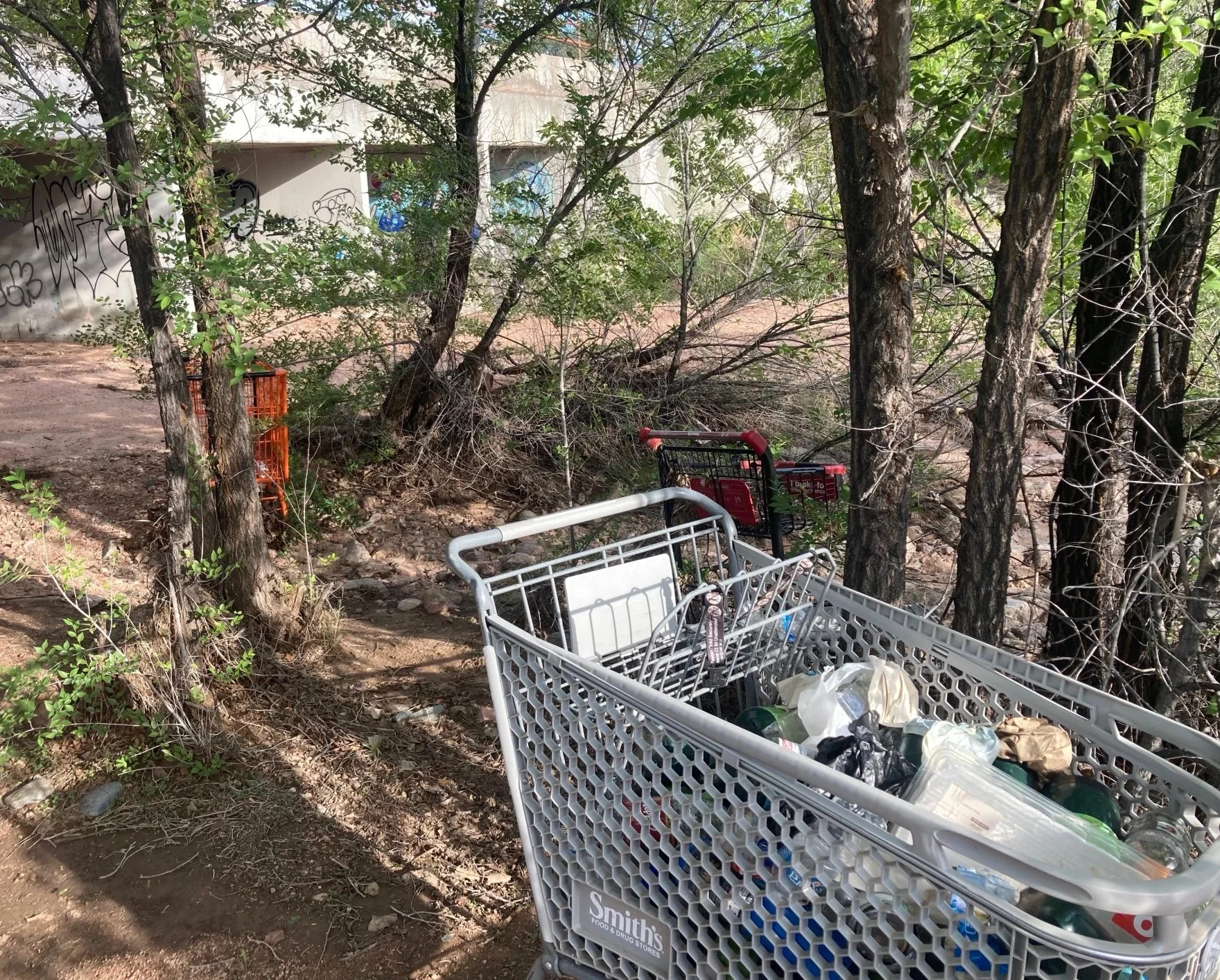It is easier to look past a person sleeping on the street than to begin to acknowledge the systems in which we are embedded that makes it possible for some people to have multiple homes and some to have no homes at all.
"Creating Art in a Burning World," After the Art
photo caption: Firescape IX: Holman Hill Burn in First Snow by Sharon Stewart. Digital photograph, 2022.
I hadn’t expected to see the charred and flooded remains of the land I knew so intimately in this exhibition. In photo after photo, I saw the story of what had happened—a story still in progress as spring runoff and summer thunderstorms bring more flooding and more erosion. The photos revealed culverts twisted beyond recognition, tractors and backhoes stuck in flood zones, massive plumes of smoke rising over vibrant green land, and sunflowers growing along arroyos.
"The Aftermath of the Hermit's Peak and Calf Canyon Fires," High Country News
photo caption: Regrowth begins in northern New Mexico following 2022’s Hermit’s Peak/Calf Canyon Fire. Photo © Sharon Stewart.
I looked east across the mountainside, where charcoaled trees seemed to stretch out forever. Across the stream to the north, another mountainside appeared as an endless ripple of black trees. Even if I could plant faster, and even with 100 people out here planting every day, the task felt insurmountable. Who are we, I wondered, to pretend we can ever repair the harm we’ve caused?
"The Myth of the Perfect Victim," second place prize in The Plentitudes Journal
Tell a particular set of lies about women (or any other group) for centuries and it becomes the status quo. Research shows that these lies and mythologies become so familiar they are more comfortable than the truth. Our brains are wired to look for short cuts. Other women say he’s OK? Well then, she must be lying.
As Jodi Kantor and Megan Twohey reveal in their book, “She Said,” about their investigative reporting of Harvey Weinstein, attorney Lisa Bloom advised Weinstein to reveal his victim’s weaknesses early. Publish a few big articles about her lies she suggested. Or her mental instability and contradictions. Discrediting her will be cake. In a memo, from Bloom to Weinstein: You should be the hero of the story, not the villain. This is very doable.
Weinstein’s eventual conviction does not disprove this as a winning strategy. It only proves that upending a centuries-old story is only possible when victims swarm from the woodwork like ghosts. One voice is not considered to be enough. Look at Scheherazade. Saving her own life was a monumental task, but freedom was not her reward. Instead, she traded death for marriage to a monarch who had killed one thousand women before her. The story of Scheherazade taking down the monarch does not exist. Call women emotional, hysterical, unstable, and irrational for centuries and you’ll find that unpeeling the lies from history causes history to come off in chunks, too. Your hands will never be large enough to hold the facade as it crumbles.
"An Ode to Model Women: Lesbians Who Showed the Way," High Country News
"The Language of Home," Orion Magazine
"A School Budgeting Project Made My Daughter Not Want Kids. Here's Why I Don't Blame Her." Huffington Post
"Where the Cactus Grows," High Desert Journal
Image: Sandra Dal Poggetto, Understory, 1993, ink on paper, 5.5 x 7 inches. Private collection.
Claret cup cacti announce themselves in everything I write. This surprised me at first, but it shouldn’t have. I’ve been pierced more than once by their spines. When in bloom, tiny vermillion bouquets dot the dry ground. They are everything I aspire to be.
"Flying Solo," Al Jazeera
Art by Richard Smith
The day after Alex came home from hospital, they found a crow on the ground.
It was a warm mid-June day in Montana. The school year was finally over – 10th grade for Alex, and sixth for Talia.
It was in early March of 2019 when Alex was admitted to residential treatment for suicidal ideation and self-harm. Although it had been a relatively mild winter for Montana, snow covered the ground. Every weekend trek we had made from Missoula to the state capital Helena to see Alex, we had worn our bulky coats.
Some weekends, Alex was allowed to check out for a few hours. We would get pizza or wander up and down Helena’s small downtown strip, or explore the ceramic statues and broken teacups strewn about the grounds at the Archie Bray studios. These were the things we did on the weekends when the nurses said Alex was stable enough for short outings. Many weekends, though, the nurses put a red wristband on Alex. This meant outings were forbidden.
"The World Demands It," Jellyfish Review
I ran north and left the sun behind. I left the cacti and the vanishing rivers, too. Winter lasts for eight months in the north. I hate being cold. But drifts of snow and low, grey clouds press down like a lid to insulate us. A freshwater sea runs under our feet — a vast aquifer that sloshes and swirls.
"Breathing Lessons," Al Jazeera
Image credit: Muaz Kory
When I reach a small tree, its brown leaves still attached and stirring in the light breeze, I test their strength. I grasp a handful of leaves, one by one, pinching them between my thumb and forefinger before tugging them earthward with a quick jerk. Of the leaves I pull, only one comes loose. The others are strong, still connected firmly to the slender limb they hang from. So far, we have not had much snow this winter. Although it is January, in Montana the paths are muddy with small patches of ice and snow here and there.
"Failure to Breathe," XRAY Literary Magazine
The diaphragm felt guilt in admitting defeat. What would happen to the body if it just laid down and took a forever nap? Would it be accused of murder? It had never heard of a diaphragm being accused of murder, but there was a first for everything. An accusation would surely lead to conviction. A life behind bars. That wouldn’t do the body any good, but the criminal justice system further breaks what is already broken, so such an outcome would be in keeping with history.
"Marco Polo in Missoula," River Teeth
"The Snack Shack Blues," Gay Magazine
Illustration by Carmen Johns
In 1984, on the edge of Highway 518, my family lived in a bright blue building with neon yellow letters looping across the front to announce its name: Snack Shack. Tourists whipped by, winding up the pass to Taos for skiing, and locals took the low road to Peñasco, a town of roughly one thousand people at the base of 10,000 foot peaks.
My parents paid $15 a month for rent.
The Snack Shack was what remained of an old set for the 1977 motorcycle movie, Sidewinder. The film crew had slapped paint on an old, crumbling structure that was half adobe and half cinder blocks. It hadn’t been lived in for decades.
"This Beautiful Place," Gay Magazine
The light has been returning for two months, but inside their cells the women can’t tell that the sun has just set. There are no windows. The yellow-orange of fluorescents light the halls. Kristin and I meet with the women twice a month, buzz into the detention center from the sidewalk, and wait for the guard to come. We pass through the metal detectors, turn in our driver’s licenses, and pause at three different bolted doors as the guard buzzes each of them open.
The light from the lengthening days makes it feel like anything is possible — for me, for the women in the jail, for the world.
"Stressing the Roots," Tin House Magazine
The fifty-two-quart cooler is filled to capacity with bags of frozen green chile. On this three-day journey of over 1,200 miles, from our small hometown in New Mexico to our new home in Missoula, Montana, I have made it my priority to keep the chile from thawing.
To read the essay, purchase Tin House Magazine, Volume 20, Number 4 (The Final Issue)
"Not the Women Frida Slept With," Indiana Review
Though my heart is free, my hands, if they stray, can be dangerous.
To read the full essay, purchase the summer 2019 issue of Indiana Review
*This essay was reprinted in the anthology “We Leave the Flowers Where They Are,” edited by Richard Fifield.
"Encounters with Snakes," Lunch Ticket
"Freeze & Thaw," The Fourth River
"Disembodied," Kenyon Review
In “Disembodied,” we see a writer investigating the natural world, her personal history, and the nature of violence and destruction in its many forms—environmental destruction, the destruction of ones own being as a means of survival, destruction in order to save those we love. She weaves together her own story with philosophy, with journalism, with science, with history, with mythology, with poetry, with linguistics, and the results are lyrical and powerful. This essay is a fine balancing act.
--Jaquira Diaz, judge of the 2016 AWP Writers Conferences & Centers Award for Creative Nonfiction
For a longer excerpt of "Disembodied," read online at the Kenyon Review. For the full essay, order the print issue of the Sept/Oct 2017 Kenyon Review.



















